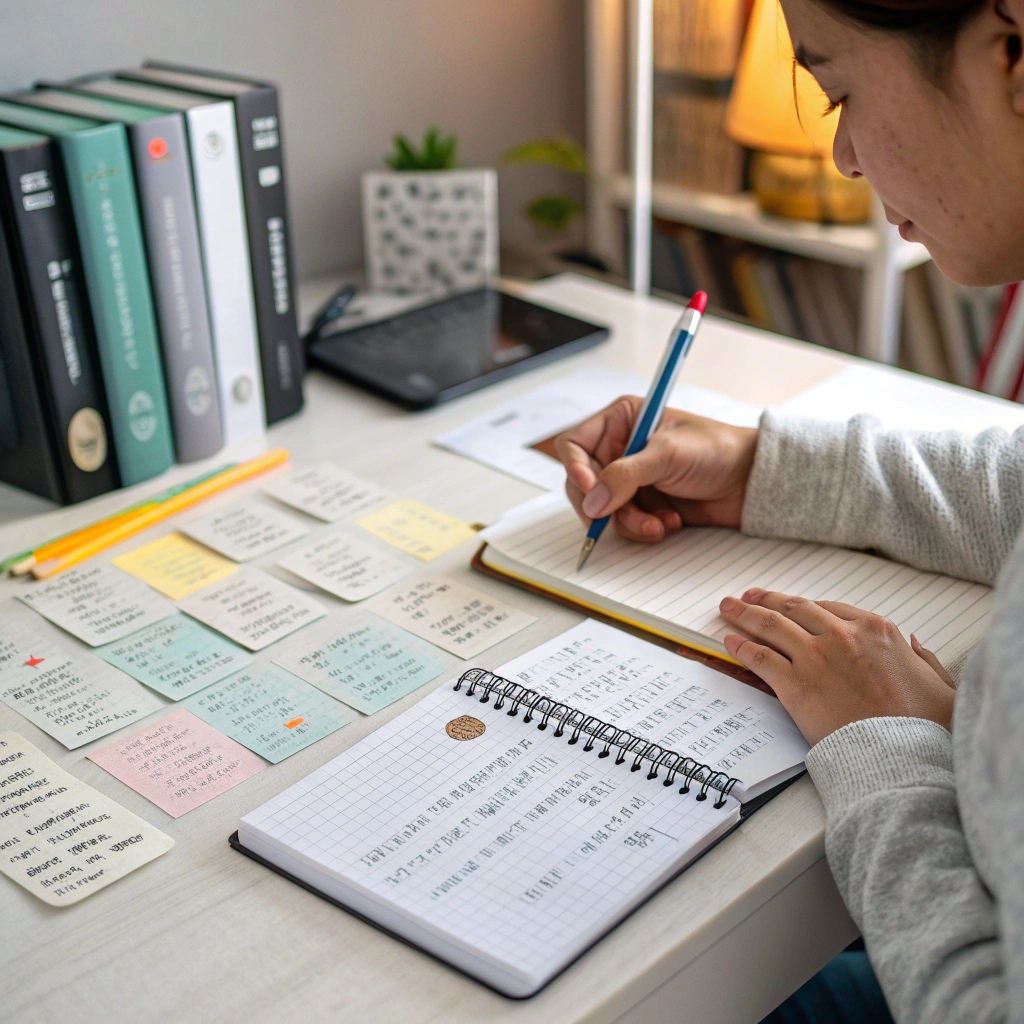Tired of feeling like you can’t remember anything? Struggling to recall where you put your keys, what day it is, or even what you had for breakfast?
You’re not alone. Forgetfulness affects millions of people worldwide, and it’s a source of frustration that can be overwhelming.
But here’s the thing: memory isn’t just about age; anyone can improve their ability to remember with the right strategies.
Imagine being able to recall entire conversations, appointments, and tasks with ease – no more scrambling to write things down or relying on calendars. The power is in your hands.
This crash course will reveal 10 proven methods that are simple yet effective…
Understand How Your Brain Works
Information enters your brain through sensory input – this can be sight, sound or touch. This triggers the release of neurotransmitters like dopamine which helps you focus on the task at hand.
As new information floods into your brain, it gets processed by various cells called neurons. These neurons are connected in a network that’s unique to each person and is shaped by their experiences and memories.
When this information is deemed important or relevant, it gets stored in areas of the brain dedicated to memory consolidation – like the hippocampus for short-term memory and the amygdala for emotional associations.
However, what often hinders memory recall is a lack of repetition. Repeating new information helps solidify its place in your long-term storage by creating connections between neurons.
A key strategy to boost your memory then would be through active recall – this involves actively recalling previously learned material rather than passively reading about it. You can also try organizing the information into categories, making a concept map or setting reminders for important tasks.
Additionally, getting enough sleep is crucial as sleep plays an essential role in clearing waste from the brain and allowing new neural connections to be formed.
Setting Up for Success – The Power of Mnemonics

Want to unlock your full memory potential? Discover how mnemonics can help you do just that. Mnemonics are techniques that help you associate new information with something already familiar, like a word, phrase, image or action. This creative approach makes it easier for the information to stick in the long term.
Mnemonics leverage your brain’s natural tendency to form associations between pieces of new information and what you’re already familiar with. The key is finding an association that’s uniquely personal and relevant to what you’re trying to remember. This could mean linking pieces of new info with something you’ve experienced before or a concept you already know well.
You can use acronyms, where each letter in the word is replaced by the first letter of an item on your list (try creating one for yourself). For instance, SCUBA becomes “S” – Scuba Diving Under Currents And Bottoms. Rhyming is another powerful technique that’s easy to recall and fun, think ‘Thirty days hath September…’ or ‘My Very Excellent Mother Just Served Us Nine pizzas.’ This rhyme helps you remember the order of operations in math.
The Loci method involves associating new information with specific locations in your home or daily routine. Picture each item on a shopping list at a specific location, like picturing your grocery items in different rooms of the house when planning for groceries this week. Lastly, visualization techniques can be used to create vivid mental images associated with what it is you want to learn.
Try these mnemonics tonight and discover how they help improve memory retention. With practice and patience, you’ll find yourself recalling even complex pieces of information with ease.
Visualizing Memories to Remember More
Visualize your way to better memory. Visualizing memories is a powerful technique that can help improve memory retention and recall by strengthening connections between neurons in your brain.
To create vivid mental images, try engaging as many senses as possible. For example, if you’re remembering a trip to the beach, relive the experience by recalling: the feel of warm sand on your skin at sunrise (try applying sunscreen first!), the sound of seagulls overhead and water rushing against shorebreakers. You might even recall an irresistible taste of saltwater or fresh seafood – that lingers long after you leave.
Emotions are also key to memory formation. What emotions did you feel during a memorable event? Were you elated, terrified, excited, or content? Connecting memories to strong feelings can make them more vivid and unforgettable. For instance, remember how your heart skipped a beat when someone said “I love you” in high school? That emotional response has become etched into your memory.
Write out detailed descriptions of events in the future tense as if they’ve already happened. This is called a script form of remembering. Using this method allows you to rehearse what might happen later on down the line and boost recall for upcoming appointments or big tests, making them seem less daunting.
By incorporating these techniques into your daily life, you can strengthen your memory and improve retrieval from past experiences through vivid imagery:
- Use sensory details
- Link memories to strong emotions
- Create mental scenarios
Remember that practice is key to incorporate visualization exercises regularly to develop a habit of visualizing memories. The more you exercise this skill, the stronger it gets.
With these simple techniques, recalling even small events and information will become easier.
Make Connections To Learn New Stuff Faster
While we’ve all struggled at times with remembering where we put our keys or what’s for dinner, there’s a way to revolutionize your learning process. Proven strategies can significantly boost your ability to learn new information by making connections between seemingly unrelated concepts.
When you connect different ideas and knowledge areas together, it creates a web that makes sense to your brain. This helps solidify what you’ve learned and prevents forgetting important details later on – a phenomenon known as the “spreading effect.” When information spreads across multiple areas of the brain, it becomes more memorable. In fact, research suggests that making connections can increase retention rates by up to 80%.
Concept Maps/Mind Maps
These visual representations of ideas can help identify patterns, relationships, and hierarchies. By seeing how different concepts relate to each other graphically, you’ll be better able to recall information from memory. For instance, neurologists use concept maps to study brain connections. A successful example is the work of Dr. John Medina, who created a mind map that helped him visualize complex neural pathways and improve his own learning.
To create your own concept maps/mind maps:
- Start with a central idea or topic
- Branch out into related concepts and subtopics
- Use colors, images, and keywords to make it visually appealing
By applying this technique, you’ll be able to recall information from memory more effectively.
Identifying Commonalities Across Subjects
When studying for exams or trying to learn new skills, try linking what you’re learning with other areas of knowledge that are relevant. For example, if you’re learning about physics, think about how it applies to real-world phenomena like engineering or technology. This can help make the subject more tangible and memorable.
To identify commonalities across subjects:
- Make a list of related concepts in each subject
- Look for patterns and connections between them
- Ask yourself: “How does this concept relate to other areas I’ve studied?”
The Elaboration Technique
When initially exposed to new ideas or skills, try elaborating on them by asking questions, creating examples, or thinking about how they apply in real-life scenarios. This technique can help deepen your understanding and retention of new information.
To use the elaboration technique:
- Ask yourself: “What is this concept’s history?” “How does it relate to other similar concepts?”
- Create a mental image or diagram that illustrates its application
- Write down examples of how you would apply this knowledge in different situations
By applying these strategies, making connections can significantly boost your ability to learn new information. In fact, studies have shown that using the elaboration technique alone can increase retention rates by up to 50%.
The Secret to Learning Tricks That Stick

Boost Your Memory with Proven Techniques
The key to retaining new skills is not just about practicing consistently, but also strategically planning how you tackle information. Focus on making learning tricks stick. This involves setting up a consistent practice routine that incorporates specific goals and repetition.
Three techniques can help you achieve lasting results:
1. Specific Goals
Define what you want to achieve with each skill or piece of information. For instance, if you’re learning a language, set specific goals such as passing a particular level on the proficiency test.
Ask yourself: What’s holding you back from achieving your goal? Is it lack of focus, inadequate practice, or unclear objectives?
Start by breaking down big goals into smaller chunks and create study plans that align with those needs. Write these plans down in a planner or spreadsheet to make them more concrete.
2. Spaced Repetition – Make Review Less Painful
Develop a daily routine that incorporates spaced repetition review material at increasingly longer intervals using tools like Anki or flashcards on sticky notes.
Be intentional with your practice sessions, allocating time for focused learning and regular reviewing. Start by setting aside 10-15 minutes each day to go over new information.
3.Mnemonic and Associations: Power Tool for Information Retention
Create mental connections between new concepts using mnemonics associate words with images or sounds that trigger specific memories.
Try the following technique: The “Acronym Method.” Convert complex terms into memorable acronyms, making it easier to recall information when needed.
Incorporating working memory techniques can significantly boost learning outcomes. One effective method is the “Method of Loci” technique to visualize and associate new concepts with vivid mental images.
Focus on using unusual items for association as your brain will have better retention power in doing so, such as picturing an image that you like or something memorable to remind it to be remembered by.
The key is not just about mastering new skills; using these techniques requires consistent effort but the payoff can be significant: A daily routine that incorporates practice will help you master new skills more efficiently.
Train Yourself To Avoid Memory Blockages
Did you know that one in three people experience memory blocks every day? Understanding how these blockages form is crucial for boosting your memory performance. Memory blockages occur when a thought or idea becomes stuck, preventing new information from being absorbed and processed.
These mental roadblocks can be triggered by various stressors, including excessive social media usage, work-related pressures, financial concerns, and even the pressure to meet deadlines. However, it’s essential to note that everyone is unique in their experiences with memory blockages. What triggers them for you might not be the same for others.
When we’re under stress or experiencing emotional turmoil, our minds’ automatic systems shut down, making it challenging for new information to enter and be processed. This phenomenon can have a profound impact on learning and retention, ultimately hindering our ability to recall specific details. Research suggests that chronic stress can lead to up to 80% decrease in working memory capacity.
To mitigate these blocks, becoming more aware of your mental state is crucial. Identify what triggers your feelings of anxiety or overwhelm, so you can take proactive steps to manage them. For instance, if stressful situations trigger memory blockages for you, try practicing relaxation techniques such as deep breathing exercises or meditation before attempting to recall information that usually gets stuck.
Moreover, changing the way you learn new things is vital in overcoming these obstacles. Repetition and novelty go hand-in-hand; variety keeps learning interesting and engaging for your brain. Consider mixing up your study materials with different textures, smells, or even colors, anything that can stimulate your senses.
When emotions come into play during times of remembering, be mindful of how you react to them. If a specific memory pops up causing you to feel anxious or negative, take a pause before moving forward with recalling more information. Take some time for self-reflection and allow yourself to process those feelings in a healthy manner.
One technique that has helped me is practicing mindfulness meditation during study sessions. By clearing my mind of distracting thoughts, I’m able to focus better on the material at hand. Similarly, many people find journaling or talking through their emotions after recalling memories helpful in managing anxiety-induced memory blocks.
In conclusion, overcoming memory blockages requires a combination of self-awareness and adaptability. By understanding your specific triggers and adapting techniques that suit you best, you can improve your ability to learn and retain new information. So take the first step by identifying areas where stress or emotions impact your mental state. It’s time for growth.
Lastly, here are some actionable strategies tailored specifically to common memory blockages:
- Use a mix of active recall and repetition
- Incorporate engaging learning techniques (e.g., gamification)
- Set realistic goals for study sessions
- Practice self-care during stressful times
Getting Your Brain In Sync
Unlock your brain’s full potential: boost your memory for better learning, productivity, and overall well-being. Did you know that even slight decreases in cognitive performance can lead to decreased job satisfaction and reduced quality of life? Let’s dive into four actionable strategies to get your brain in sync.
Establishing a consistent daily routine is key to boosting your memory. Regular exercise has been shown to enhance BDNF levels, which is crucial for neural growth and plasticity. For example, brisk walking or cycling can improve sleep quality and increase alertness during the day. Start small – 5-10 minutes each day of physical activity is all you need to see noticeable changes.
A cluttered workspace can be a major productivity killer. Minimize distractions by creating an optimal study environment that promotes focus. Set up a dedicated study area with necessary tools (e.g., pens, books) and avoid digital temptations like social media or email notifications during your focused work periods. This simple adjustment can lead to significant improvements in cognitive performance.
Establishing a consistent sleep schedule is also vital for memory consolidation. During REM sleep, your brain processes and consolidates memories from short-term to long-term storage. A conducive learning atmosphere is essential for this process, with minimal distractions helping the brain focus on new information. Aim for 7-8 hours of restful sleep each night.
Finally, optimize your daily routine by incorporating mindfulness practices that reduce stress and improve cognitive function. Take a few minutes before bed to practice deep breathing exercises or meditation, which can lead to better sleep quality and improved concentration during the day. By implementing these strategies into your daily routine, you’ll be well on your way to boosting memory for better learning, productivity, and overall well-being.
How Music Can Help You Memorize Better

Fact: Music has long been known to be a powerful tool for improving memory and cognitive function. According to research published in Nature Reviews Neuroscience, listening to music can improve memory recall in as little as 30 minutes. For instance, one study found that college students who listened to Mozart’s music scored higher on spatial-temporal skills than those who did not.
Music plays an essential role in enhancing memory recall by activating both sides of the brain and increasing the release of dopamine, which is associated with pleasure and reward. The process begins when you first hear a piece of music – it triggers a response that stimulates new pathways through your brain, making it easier to remember song lyrics or other information.
Here are some tips on how to use music effectively:
1. Singing while listening to the song will help solidify the information in your memory by creating an auditory-visual association and strengthening neural connections. Try humming a tune you’re trying to recall – it’s like having a built-in GPS for memories!
2. Actively engaging with what you’re hearing can improve memory retention by increasing dopamine release and promoting cognitive flexibility. For example, when listening to your favorite song from the 80s, try singing along or reciting lyrics out loud while brushing your teeth or cooking dinner – this will help encode those tunes into long-term storage.
3. Creating playlists that are specifically designed for memorization can be a game-changer. Aim to include songs with consistent tempos, use rhyming lyrics as mnemonics, and experiment with different genres to find what works best for you.
Whether it’s classical, pop, rock or jazz – the type of music is less important than getting your brain involved in the process. Experimenting with various types can help uncover your unique learning style and maximize memory recall.
Musical memories are a powerful way to learn new information by leveraging rhyming lyrics as mnemonics or creating memorable melodies associated with pieces of info – it’s like having an inside joke for your brain!
By combining the power of music with other proven methods, such as repetition and visualization, you can create a formidable memory powerhouse. So next time you’re trying to remember something new, grab some tunes that resonate with you and let the musical memories begin!
From Puzzles and Games, Boosting Recall Naturally
Did you know that some everyday activities can actually help boost your recall naturally?
Puzzles and brain teasers are a great way to challenge the mind and keep it active, leading to improved memory. Try using online resources like word association games or puzzles with specific goals in mind – such as Sudoku’s grid system for spatial reasoning improvement.
Write down 5-10 words from different categories (e.g., food, countries, animals) on a piece of paper and try to come up with related words within one minute. Take note that some common themes might emerge during this activity, such as associating certain foods with cultural events or environments.
Try Sudoku puzzles for example: once you master the basic rules of placing numbers in ascending order without repeating any row, column or block then it can improve your logical reasoning and pattern recognition skills. As you progress to more advanced levels, the mental exercise will become increasingly challenging and stimulating.
Playing brain teasers is another excellent way to engage your mind.
Logic Grids: these types of puzzles challenge deductive thinking as you try to deduce a conclusion from given premises.
Sudoku: this puzzle game helps improve spatial reasoning as it involves placing numbers on a grid according to specific rules, which can also help in remembering the positions of objects.
If it seems difficult don’t get discouraged! there is no right answer; just enjoy the challenge of figuring out how all pieces fit together or if you can beat a certain score in an online game.
Using brain teasers regularly as part of your daily routine may have several long-term benefits for your cognitive health and mental flexibility.
Boost Your Memory with Proven Crash Course Methods
Tap into the Power of Emotional Memories
The human brain is wired to recall emotions more vividly than facts and figures. Leveraging this natural ability can be a game-changer for memory improvement.
Research shows that emotional connections are stronger than rational thoughts, making it easier to remember personal anecdotes and life experiences. This means that recalling happy memories or associating new information with a significant event in your life could make all the difference.
By incorporating emotional triggers into your learning strategy, you’ll find yourself remembering key concepts more easily and retaining valuable information for years to come.
So, focus on finding what makes studying enjoyable by using music, discussing topics with others or making connections between memories and new knowledge. This will not only boost memory but also make the learning experience more fulfilling.
Take immediate action today to harness the power of emotional memories in your academic pursuits and unlock a world of improved retention and comprehension.
